Volunteer spotlight: Andy and Sherry Lank
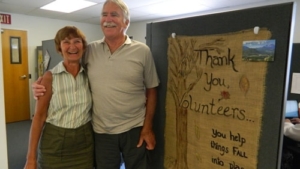 In 2012, Andy Lank’s parents died within eight months of each other. In the midst of caring for them and then grieving their deaths, Andy and his wife, Sherry, found consolation from the people of Homeland Hospice.
In 2012, Andy Lank’s parents died within eight months of each other. In the midst of caring for them and then grieving their deaths, Andy and his wife, Sherry, found consolation from the people of Homeland Hospice.
“They really helped us through the grieving process and were able to ask the right kinds of questions that helped us process everything,” says Andy. “They make you feel comfortable to talk about grieving.”
Today, Andy and Sherry Lank, of Enola, are mainstays among the dedicated volunteers of Homeland Hospice.
“We were extremely pleased with the care and comfort Andy’s parents received,” says Sherry. “We wanted to be a part of it and give back.”
The hospice movement, founded by volunteers, continues to rely on dedicated people who share their time, talents, and compassion. Andy and Sherry bring the perspective of caring for loved ones at the end of their lives and finding comfort and support through Homeland Hospice.
“Helping people who are at the end of their lives makes you forget about your own aches and pains and problems,” says Sherry. “It’s hard to be . . .” She pauses, looking for the word.
“Sorry for yourself when you see the condition of someone else,” says Andy, completing the sentence.
Sherry, who started volunteering in 2012, helps Homeland Hospice patients with whatever they need, whether it’s getting groceries, reading out loud, or sitting and talking.
“One woman I visited, we’d sit and watch Hallmark movies,” she says. Sherry also helps with paperwork, freeing staff “to do more important things.”
Andy started volunteering in January 2015, after retiring from a career in installing and servicing dental equipment. Homeland Hospice personalizes services to the needs of families and patients, he says, and they understand that “everybody deals with grief in their own way.” He has helped with administrative work, built a storage shelf, and visited patients.
A U.S. Navy veteran, Andy also joined a new initiative to honor hospice patients who are veterans. He goes to them, wearing a Navy veteran’s hat, and reads a certificate recognizing their service.
“It makes me feel good to see that sparkle in their eye when you mention their military service and they see another vet honoring them,” Andy says. “It feel goods to touch their lives.”
Together, Andy and Sherry participate in Homeland Hospice fundraisers and events. He was the hot dog guy for the hospice yard sale. She went Christmas caroling to patients’ homes. The Lanks “help in so many different ways,” says Leanne Porterfield, Homeland Hospice Coordinator of Volunteers. “They’re always willing to jump in and help whenever we ask.”
Andy credits Sherry with bringing her upbeat and inquisitive nature to Homeland Hospice. Sherry says that Andy, with his infectious laugh, “is the kind of guy you just want to be around.”
When it comes to Homeland Hospice, both are ready to do whatever needs to be done.
“I hate to say no to them,” says Sherry, “because they never say no to us.”

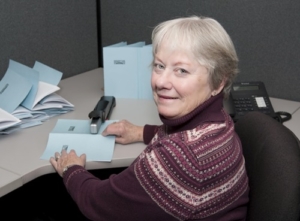 Hospice care in America was founded by volunteers and remains a core part of the strength, support, services and comfort that hospice continues to provide to patients and their loved ones. Indeed, Medicare regulations require that hospices have trained volunteers for the services they deliver to individuals and families.
Hospice care in America was founded by volunteers and remains a core part of the strength, support, services and comfort that hospice continues to provide to patients and their loved ones. Indeed, Medicare regulations require that hospices have trained volunteers for the services they deliver to individuals and families.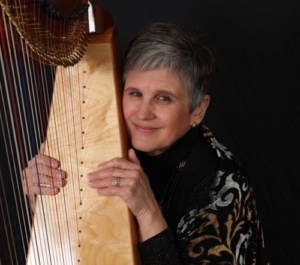 Human beings don’t simply enjoy music. Our minds and bodies need and thrive on it. Sound and vibration stimulate every region of the brain. Music can heal and comfort. It can even free the soul.
Human beings don’t simply enjoy music. Our minds and bodies need and thrive on it. Sound and vibration stimulate every region of the brain. Music can heal and comfort. It can even free the soul.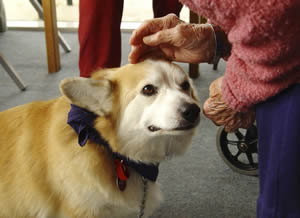 Time is precious. And life is to be lived. None of this changes when time grows short. In fact, the richness of remaining days should be as full as possible.
Time is precious. And life is to be lived. None of this changes when time grows short. In fact, the richness of remaining days should be as full as possible.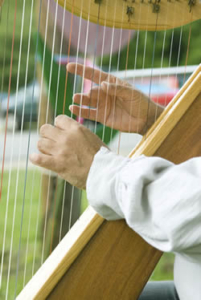 “We feel we can improve the quality of life of someone, and these services help us do this,” says Homeland Hospice Director Sue Minarik, RN.
“We feel we can improve the quality of life of someone, and these services help us do this,” says Homeland Hospice Director Sue Minarik, RN.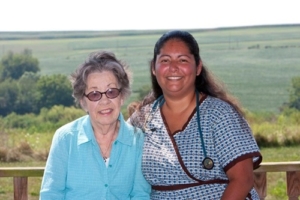 For those unfamiliar with hospice, the very mention may give rise to uneasy thoughts about death. But in reality, hospice care is all about creating a quality of life for patients.
For those unfamiliar with hospice, the very mention may give rise to uneasy thoughts about death. But in reality, hospice care is all about creating a quality of life for patients.
